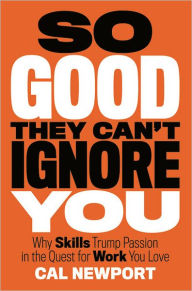15. So Good They Can't Ignore You - Cal Newport (📱)
02 Apr 2017
Rating 9/10
Reading Notes:
The things that make a great job great, I discovered, are rare and valuable. If you want them in your working life, you need something rare and valuable to offer in return. In other words, you need to be good at something before you can expect a good job.
Don’t follow your passion; rather, let it follow you in your quest to become, in the words of my favorite Steve Martin quote, “so good that they can’t ignore you.”
Do What Steve Jobs Did, Not What He Said.
A job, in Wrzesniewski’s formulation, is a way to pay the bills, a career is a path toward increasingly better work, and a calling is work that’s an important part of your life and a vital part of your identity.
Passion Is a Side Effect of Mastery
“[Figure] out what you like to do… and then find a place that needs people like you.”
The craftsman mindset, a focus on what value you’re producing in your job, and the passion mindset, a focus on what value your job offers you.
Whereas the craftsman mindset focuses on what you can offer the world, the passion mindset focuses instead on what the world can offer you.
In other words, the passion mindset is almost guaranteed to keep you perpetually unhappy and confused.
The craftsman mindset offers clarity, while the passion mindset offers a swamp of ambiguous and unanswerable questions.
There’s something liberating about the craftsman mindset: It asks you to leave behind self-centered concerns about whether your job is “just right,” and instead put your head down and plug away at getting really damn good. No one owes you a great career, it argues; you need to earn it—and the process won’t be easy.
You put aside the question of whether your job is your true passion, and instead turn your focus toward becoming so good they can’t ignore you. That is, regardless of what you do for a living, approach your work like a true performer.
Supply and demand says that if you want these traits you need rare and valuable skills to offer in return. Think of these rare and valuable skills you can offer as your career capital.
The biggest obstacle between you and work you love is a lack of courage—the courage required to step away from “other people’s definition of success” and to follow your dream.
Giving people more control over what they do and how they do it increases their happiness, engagement, and sense of fulfillment.
“I have this principle about money that overrides my other life rules,” he said. “Do what people are willing to pay for.”
The Law of Financial Viability. When deciding whether to follow an appealing pursuit that will introduce more control into your work life, seek evidence of whether people are willing to pay for it. If you find this evidence, continue. If not, move on.
Into your work life, seek evidence of whether people are willing to pay for it. If you find this evidence, continue. If not, move on.
Instead, it’s about using money as a “neutral indicator of value”—a way of determining whether or not you have enough career capital to succeed with a pursuit. I called this the law of financial viability
“Passion” is bad advice, as most people aren’t born with pre-existing passions waiting to be discovered. If your goal is to love what you do, you must first build up “career capital” by mastering rare and valuable skills, and then cash in this capital for the traits that define great work. As I’ll explain, mission is one of these desirable traits, and like any such desirable trait, it too requires that you first build career capital—a mission launched without this expertise is likely doomed to sputter and die.
Hardness scares off the daydreamers and the timid, leaving more opportunity for those like us who are willing to take the time to carefully work out the best path forward and then confidently take action.
Seth Godin in his 2002 bestseller, Purple Cow. As he elaborated in a Fast Company manifesto he published on the subject: “The world is full of boring stuff—brown cows—which is why so few people pay attention…. A purple cow… now that would stand out.
If your goal is to love what you do, I discovered, “follow you passion” can be bad advice. It’s more important to become good at something rare and valuable, and then invest the career capital this generates into the˲at type of traits that make a job great.
the motivation to write my first book was an idle dare leveled by an entrepreneur I admired whom I met one night for drinks: “Don’t just talk about it,” he scolded me when I offhandedly mentioned the book idea. “If you think it would be cool, go do it.